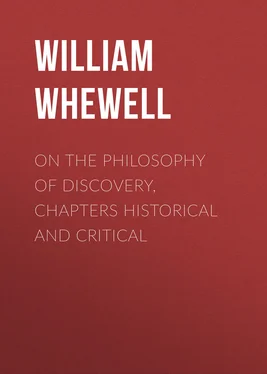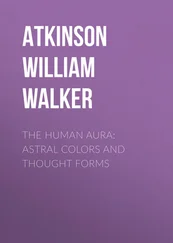William Whewell - On the Philosophy of Discovery, Chapters Historical and Critical
Здесь есть возможность читать онлайн «William Whewell - On the Philosophy of Discovery, Chapters Historical and Critical» — ознакомительный отрывок электронной книги совершенно бесплатно, а после прочтения отрывка купить полную версию. В некоторых случаях можно слушать аудио, скачать через торрент в формате fb2 и присутствует краткое содержание. Жанр: foreign_prose, foreign_religion, Философия, foreign_psychology, foreign_antique, на английском языке. Описание произведения, (предисловие) а так же отзывы посетителей доступны на портале библиотеки ЛибКат.
- Название:On the Philosophy of Discovery, Chapters Historical and Critical
- Автор:
- Жанр:
- Год:неизвестен
- ISBN:нет данных
- Рейтинг книги:5 / 5. Голосов: 1
-
Избранное:Добавить в избранное
- Отзывы:
-
Ваша оценка:
- 100
- 1
- 2
- 3
- 4
- 5
On the Philosophy of Discovery, Chapters Historical and Critical: краткое содержание, описание и аннотация
Предлагаем к чтению аннотацию, описание, краткое содержание или предисловие (зависит от того, что написал сам автор книги «On the Philosophy of Discovery, Chapters Historical and Critical»). Если вы не нашли необходимую информацию о книге — напишите в комментариях, мы постараемся отыскать её.
On the Philosophy of Discovery, Chapters Historical and Critical — читать онлайн ознакомительный отрывок
Ниже представлен текст книги, разбитый по страницам. Система сохранения места последней прочитанной страницы, позволяет с удобством читать онлайн бесплатно книгу «On the Philosophy of Discovery, Chapters Historical and Critical», без необходимости каждый раз заново искать на чём Вы остановились. Поставьте закладку, и сможете в любой момент перейти на страницу, на которой закончили чтение.
Интервал:
Закладка:
7.( Melancthon. )—It is not easy to point out with precision the connexion between the efforts at a Reform in Philosophy, and the great Reformation of Religion in the sixteenth century. The disposition to assert (practically at least) a freedom of thinking, and to reject the corruptions which tradition had introduced and authority maintained, naturally extended its influence from one subject to another; and especially in subjects so nearly connected as theology and philosophy. The Protestants, however, did not reject the Aristotelian system; they only reformed it, by going back to the original works of the author, and by reducing it to a conformity with Scripture. In this reform, Melancthon was the chief author, and wrote works on Logic, Physics, Morals, and Metaphysics, which were used among Protestants. On the subject of the origin of our knowledge, his views contained a very philosophical improvement of the Aristotelian doctrines. He recognized the importance of Ideas, as well as of Experience. "We could not," he says 127 127 Melancthon, De Anima , p. 207, quoted in Tenneman, ix. 121.
, "proceed to reason at all, except there were by nature innate in man certain fixed points, that is, principles of science;—as Number, the recognition of Order and Proportion, logical, geometrical, physical and moral Principles. Physical principles are such as these,—everything which exists proceeds from a cause,—a body cannot be in two places at once,—time is a continued series of things or of motions,—and the like." It is not difficult to see that such Principles partake of the nature of the Fundamental Ideas which we have attempted to arrange and enumerate in a previous part of this work.
Before we proceed to the next chapter, which treats of the Practical Reformers of Scientific Method, let us for an instant look at the strong persuasion implied in the titles of the works of this period, that the time of a philosophical revolution was at hand. Telesius published De Rerum Natura juxta propria principia ; Francis Helmont, Philosophia vulgaris refutata ; Patricius, Nova de Universis Philosophia ; Campanella, Philosophia sensibus demonstrata, adversus errores Aristotelis ; Bruno professed himself the author of a Nolan Philosophy ; and Ramus of a New Logic . The age announced itself pregnant; and the eyes of all who took an interest in the intellectual fortunes of the race, were looking eagerly for the expected offspring.
CHAPTER XIV.
The Practical Reformers of Science
1. Character of the Practical Reformers. —We now come to a class of speculators who had perhaps a greater share in bringing about the change from stationary to progressive knowledge, than those writers who so loudly announced the revolution. The mode in which the philosophers of whom we now speak produced their impressions on men's minds, was very different from the procedure of the theoretical reformers. What these talked of, they did; what these promised, they performed. While the theorists concerning knowledge proclaimed that great advances were to be made, the practical discoverers went steadily forwards. While one class spoke of a complete Reform of scientific Methods, the other, boasting little, and often thinking little of Method, proved the novelty of their instrument by obtaining new results. While the metaphysicians were exhorting men to consult experience and the senses, the physicists were examining nature by such means with unparalleled success. And while the former, even when they did for a moment refer to facts, soon rushed back into their own region of ideas, and tried at once to seize the widest generalizations, the latter, fastening their attention upon the phenomena, and trying to reduce them to laws, were carried forwards by steps measured and gradual, such as no conjectural view of scientific method had suggested; but leading to truths as profound and comprehensive as any which conjecture had dared to anticipate. The theoretical reformers were bold, self-confident, hasty, contemptuous of antiquity, ambitious of ruling all future speculations, as they whom they sought to depose had ruled the past. The practical reformers were cautious, modest, slow, despising no knowledge, whether borrowed from tradition or observation, confident in the ultimate triumph of science, but impressed with the conviction that each single person could contribute a little only to its progress. Yet though thus working rather than speculating,—dealing with particulars more than with generals,—employed mainly in adding to knowledge, and not in defining what knowledge is, or how additions are to be made to it,—these men, thoughtful, curious, and of comprehensive minds, were constantly led to important views on the nature and methods of science. And these views, thus suggested by reflections on their own mental activity, were gradually incorporated with the more abstract doctrines of the metaphysicians, and had a most important influence in establishing an improved philosophy of science. The indications of such views we must now endeavour to collect from the writings of the discoverers of the times preceding the seventeenth century.
Some of the earliest of these indications are to be found in those who dealt with Art rather than with Science. I have already endeavoured to show that the advance of the arts which give us a command over the powers of nature, is generally prior to the formation of exact and speculative knowledge concerning those powers. But Art, which is thus the predecessor of Science, is, among nations of acute and active intellects, usually its parent. There operates, in such a case, a speculative spirit, leading men to seek for the reasons of that which they find themselves able to do. How slowly, and with what repeated deviations men follow this leading, when under the influence of a partial and dogmatical philosophy, the late birth and slow growth of sound physical theory shows. But at the period of which we now speak, we find men, at length, proceeding in obedience to the impulse which thus drives them from practice to theory;—from an acquaintance with phenomena to a free and intelligent inquiry concerning their causes.
2. Leonardo da Vinci. —I have already noted, in the History of Science, that the Indistinctness of Ideas, which was long one main impediment to the progress of science in the middle ages, was first remedied among architects and engineers. These men, so far at least as mechanical ideas were concerned, were compelled by their employments to judge rightly of the relations and properties of the materials with which they had to deal; and would have been chastised by the failure of their works, if they had violated the laws of mechanical truth. It was not wonderful, therefore, that these laws became known to them first. We have seen, in the History , that Leonardo da Vinci, the celebrated painter, who was also an engineer, is the first writer in whom we find the true view of the laws of equilibrium of the lever in the most general case. This artist, a man of a lively and discursive mind, is led to make some remarks 128 128 His works have never been published, and exist in manuscript in the library of the Institute at Paris. Some extracts were published by Venturi, Essai sur les Ouvrages de Leonard da Vinci . Paris, 1797.
on the formation of our knowledge, which may show the opinions on that subject that already offered themselves at the beginning of the sixteenth century 129 129 Leonardo died in 1520, at the age of 78.
. He expresses himself as follows:—"Theory is the general, Experiments are the soldiers. The interpreter of the artifices of nature is Experience: she is never deceived. Our judgment sometimes is deceived, because it expects effects which Experience refuses to allow." And again, "We must consult Experience, and vary the circumstances till we have drawn from them general rules; for it is she who furnishes true rules. But of what use, you ask, are these rules; I reply, that they direct us in the researches of nature and the operations of art. They prevent our imposing upon ourselves and others by promising ourselves results which we cannot obtain.
Интервал:
Закладка:
Похожие книги на «On the Philosophy of Discovery, Chapters Historical and Critical»
Представляем Вашему вниманию похожие книги на «On the Philosophy of Discovery, Chapters Historical and Critical» списком для выбора. Мы отобрали схожую по названию и смыслу литературу в надежде предоставить читателям больше вариантов отыскать новые, интересные, ещё непрочитанные произведения.
Обсуждение, отзывы о книге «On the Philosophy of Discovery, Chapters Historical and Critical» и просто собственные мнения читателей. Оставьте ваши комментарии, напишите, что Вы думаете о произведении, его смысле или главных героях. Укажите что конкретно понравилось, а что нет, и почему Вы так считаете.












